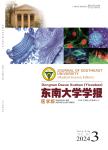Role of intravenous immunoglobulin in suspected or proven neonatal sepsis
Role of intravenous immunoglobulin in suspected or proven neonatal sepsis作者机构:School of MedicineSoutheast University Department of Pediatrics Zhongda HospitalSoutheast University
出 版 物:《东南大学学报(医学版)》 (Journal of Southeast University(Medical Science Edition))
年 卷 期:2013年第32卷第5期
页 面:621-625页
学科分类:1002[医学-临床医学] 100202[医学-儿科学] 10[医学]
基 金:Scientific and technological projects in Jiangsu Province (LB09073)
主 题:neonatal sepsis intravenous immunoglobulin review article
摘 要:Neonatal sepsis remains the major cause of mortality and morbidity including neurodevelopmental impairment and prolonged hospital stay in newborn infants. Despite of advances in technology and optimal antibiotic treatment,incidence of neonatal sepsis and its complications remains unacceptably high especially in developing countries. Premature neonates in particular are at higher risk due to developmentally immature host defence mechanisms. Though not approved by Food and Drug Administration(FDA) U. S. A,off label use of intravenous immunoglobulin as prophylactic or adjuvant agent in suspected or proven neonatal infections continues in many countries. In a recent large multicenter clinical trial by International Neonatal Immunotherapy Study(INIS) group, the use of polyvalent IgG immune globulin was not associated with significant differences in the risk of major complications or other adverse outcomes in neonates with suspected or proven sepsis. Hence,use of intravenous immunoglobulin in suspected or proven neonatal sepsis is not recommended. The expense of prophylactic use of intravenous immunoglobulin administration for both term and preterm newborn population,given the minimal benefit as demonstrated by many individual studies and by meta-analysis is not justified.



